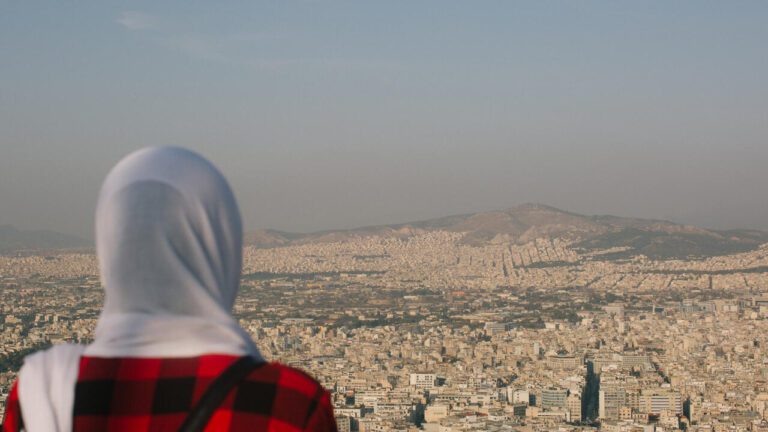There are more than 100 million refugees and displaced people worldwide – the highest number ever recorded. The majority of displaced people live in cities where earning a reliable income is essential for survival and necessary for rebuilding livelihoods.
THE Resilient Future Agenda, run by the International Rescue Committee in partnership with the Citi Foundation, helps young people in cities around the world learn job skills and start their own businesses. The program provides training, mentoring and financial assistance to young entrepreneurs and focuses on supporting refugees and internally displaced people.
More than 5,400 people in seven countries have participated in the Resilient Futures program since its launch in 2017. In 2023, an additional 885 entrepreneurs will benefit from the program.
Resilient Futures has adapted to focus on building the economic resilience of young entrepreneurs and educating them on the importance of implementing health regulations and safe business practices in the wake of the COVID-19 pandemic.
Here are the stories of nine entrepreneurs who have benefited from the Resilient Futures program.
Abigail, A² beauty salon, Nigeria
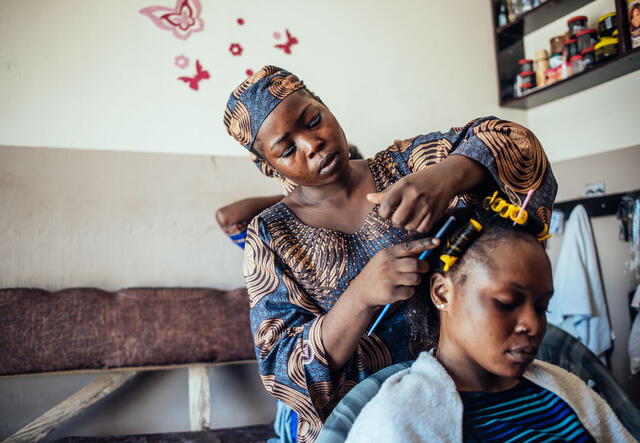
Abigail, 25, does hair for a client in her salon; she was inspired by her aunt Vivian, who also owns a beauty business in Nigeria.
Photo: KC Nwakalor for the IRC
Having my own business makes me very happy. Thanks to my salon, I was able to save more money to help my family and take care of my future.
Abigail and her family returned to Maiduguri, a city in northeastern Nigeria, after the end of the conflict that claimed her father’s life in 2009. With the support of her family members and the Resilient Futures program of IRC, Abigail started her own business, A² Beauty Salon.
Hudaifah, beekeeper, Jordan
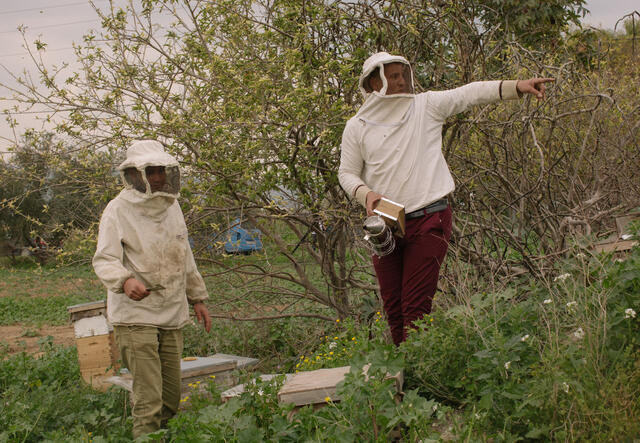
Hudaifah (right) and her business partner Yousef work in their apiary outside Amman, Jordan.
Photo: Elena Heatherwick for the IRC
I hope our business will grow and we can expand to export honey all over the world.
After enrolling in the Resilient Futures program, Hudaifah received a grant to start a beekeeping business. He works alongside his business partner, Yousef, to harvest honey and educate local farmers about the agricultural benefits provided by bees.
Kristine, clothing designer, Germany
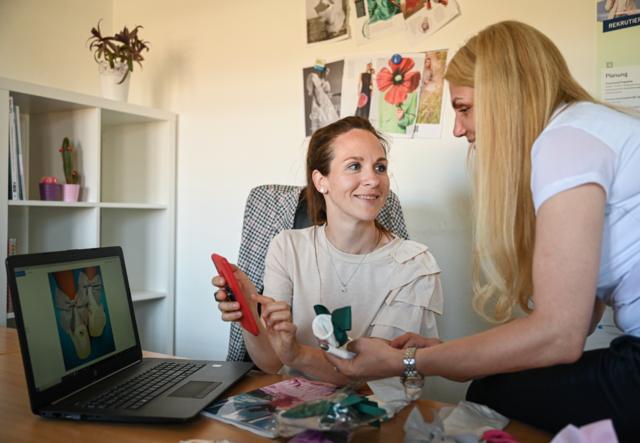
Kristine (left) maintains her online fashion business, where she sells a range of handcrafted items.
Photo: Lena Mucha for the IRC
I have already accomplished a lot and this is just the beginning.
Kristine, a mother of two, left Latvia in 2016 with her family to seek a better life in Germany. After settling in Nuremberg, she participated in the Resilient Futures program and received a grant to start an online business, which she hopes will fund her children’s education.
Rehabilitation Center, Tailor, Jordan
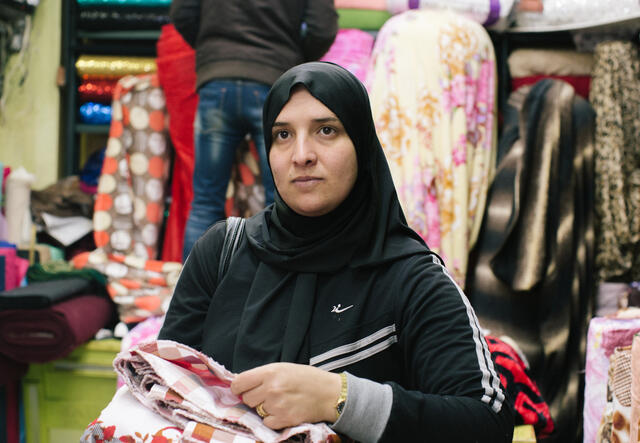
Rehab, a refugee and mother of five, buys supplies at a store for her sewing business.
Photo: Elena Heatherwick for the IRC
I want to expand my business and start selling to stores, supermarkets, schools and shopping centers.
In 2013, Rehab fled her home in Aleppo, Syria, after the war claimed the life of one of her daughters. After resettling in Amman, she began working as a seamstress and, with the help of the Resilient Futures program, bought a sewing machine to start her own business.
Lydia, Emmy Quality Shoe Production, Nigeria
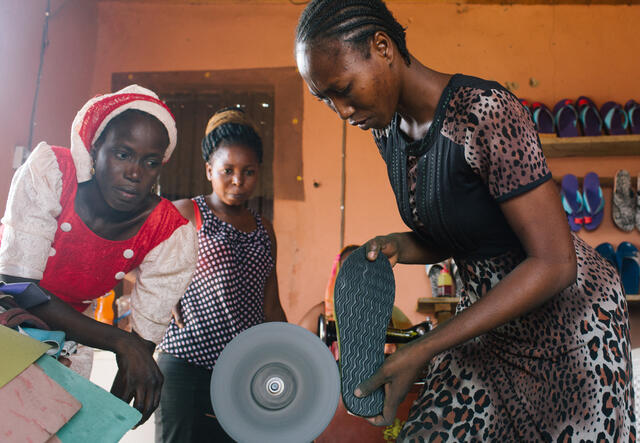
Lydia (right) is working on a sandal at her store in Yola, Nigeria, which she hopes to expand to outlets around the world.
Photo: Elena Heatherwick for the IRC
My dream is to have different branches in Abuja, USA and everywhere, so that the whole world knows my name!
Four years after armed groups forced Lydia and her family from their home, she opened Emmy Quality Shoe Production. The Resilient Futures program helped Lydia design a business plan and provided her with a grant to start her business. Today, Lydia describes herself as a proud businesswoman and is able to provide for her children.
Tarek, Salon Jood, Jordan
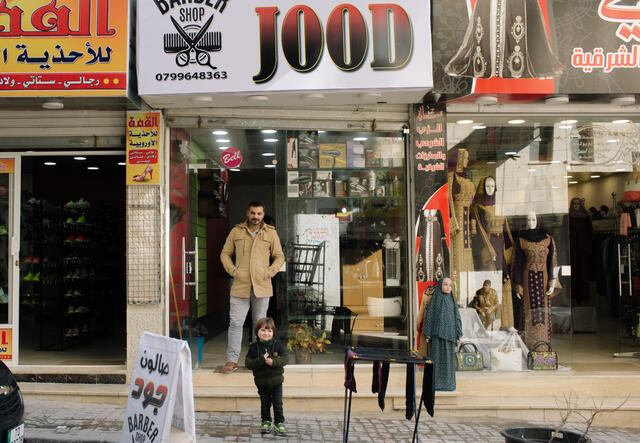
Tarek poses with his 3-year-old son, Jood, outside his hair salon in Jerash, Jordan.
Photo: Elena Heatherwick for the IRC
I named my living room after my son because my children are the most important thing in my life.
Tarek fled the war in Syria and took refuge in Jordan, where he met his wife, started a family and taught himself how to cut his hair. With support from the Resilient Futures program, he opened his own hair salon and has since hired two other Syrian refugees.
Laraba, Lasim Grains, Nigeria
Before, I was afraid at the market, because I was the only woman there, but now I negotiate and buy with complete confidence: the traders say that this girl is a businesswoman!
In 2014, the armed group Boko Haram invaded the village of Laraba, killing several members of his family. Laraba and her younger brother fled to Yola, where she enrolled in the Resilient Futures program and now operates a grain store, selling rice and other staples.
Musa, retailer, Nigeria
My business makes me feel in control, even if I start small.
Musa, 21, became the sole provider for his mother and eight siblings after armed groups killed his father and sent the family fleeing to Yola. There, Musa studied business through the Resilient Futures program, opened a store selling motor oil and auto parts, and quickly grew to employ two of his younger brothers.
Moussa, chef, Greece
I like to push people to discover new flavors; when people try new foods, it opens their minds.
Moussa lost both his parents and his younger brother before fleeing Ivory Coast and heading to Greece. In Athens, he enrolled in the Resilient Futures program with the intention of opening a restaurant called “Our Home” and sharing a taste of Ivorian culture.


